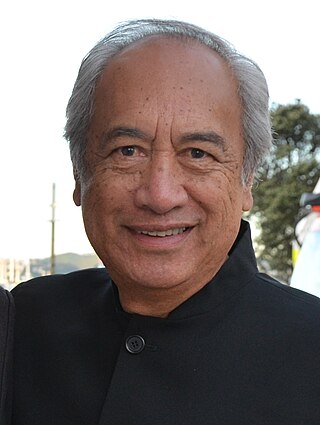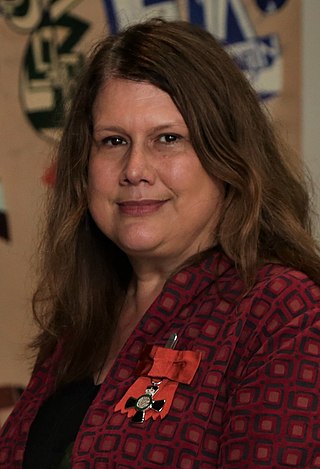Related Research Articles

New Zealand literature is literature, both oral and written, produced by the people of New Zealand. It often deals with New Zealand themes, people or places, is written predominantly in New Zealand English, and features Māori culture and the use of the Māori language. Before the arrival and settlement of Europeans in New Zealand in the 19th century, Māori culture had a strong oral tradition. Early European settlers wrote about their experiences travelling and exploring New Zealand. The concept of a "New Zealand literature", as distinct from English literature, did not originate until the 20th century, when authors began exploring themes of landscape, isolation, and the emerging New Zealand national identity. Māori writers became more prominent in the latter half of the 20th century, and Māori language and culture have become an increasingly important part of New Zealand literature.

Maurice Gough Gee is a New Zealand novelist. He is one of New Zealand's most distinguished and prolific authors, having written over thirty novels for adults and children, and has won numerous awards both in New Zealand and overseas, including multiple top prizes at the New Zealand Book Awards, the James Tait Black Memorial Prize in the UK, the Katherine Mansfield Menton Fellowship, the Robert Burns Fellowship and a Prime Minister's Award for Literary Achievement. In 2003 he was recognised as one of New Zealand's greatest living artists across all disciplines by the Arts Foundation of New Zealand, which presented him with an Icon Award.
Fleur Adcock was a New Zealand poet and editor. Of English and Northern Irish ancestry, Adcock lived much of her life in England. She is well-represented in New Zealand poetry anthologies, was awarded an honorary doctorate of literature from Victoria University of Wellington, and was awarded an OBE in 1996 for her contribution to New Zealand literature. In 2008 she was made a Companion of the New Zealand Order of Merit, for services to literature.

Witi Tame Ihimaera-Smiler is a New Zealand author. Raised in the small town of Waituhi, he decided to become a writer as a teenager after being convinced that Māori people were ignored or mischaracterised in literature. He was the first Māori writer to publish a collection of short stories, with Pounamu, Pounamu (1972), and the first to publish a novel, with Tangi (1973). After his early works, he took a ten-year break from writing, during which he focused on editing an anthology of Māori writing in English.

William Manhire is a New Zealand poet, short story writer, emeritus professor, and New Zealand's inaugural Poet Laureate (1997–1998). He founded New Zealand's first creative writing course at Victoria University of Wellington in 1975, founded the International Institute of Modern Letters in 2001, and has been a strong promoter of New Zealand literature and poetry throughout his career. Many of New Zealand's leading writers graduated from his courses at Victoria. He has received many notable awards including a Prime Minister's Award for Literary Achievement in 2007 and an Arts Foundation Icon Award in 2018.

Albert Tuaopepe Wendt is a Samoan poet and writer who lives in New Zealand. He is one of the most influential writers in Oceania. His notable works include Sons for the Return Home, published in 1973, and Leaves of the Banyan Tree, published in 1979. As an academic he has taught at universities in Samoa, Fiji, Hawaii and New Zealand, and from 1988 to 2008 was the professor of New Zealand literature at the University of Auckland.
Lydia Joyce Wevers was a New Zealand literary historian, literary critic, editor, and book reviewer. She was an academic at Victoria University of Wellington for many years, including acting as director of the Stout Research Centre for New Zealand Studies from 2001 to 2017. Her academic research focussed on New Zealand literature and print culture, as well as Australian literature. She wrote three books, Country of Writing: Travel Writing About New Zealand 1809–1900 (2002), On Reading (2004) and Reading on the Farm: Victorian Fiction and the Colonial World (2010), and edited a number of anthologies.
Anne Kennedy is a New Zealand novelist, poet, and filmwriter.

Sir Vincent Gerard O'Sullivan was a New Zealand poet, short story writer, novelist, playwright, critic, editor, biographer, librettist, and academic. From 1988 to 2004 he was a professor of English literature at Victoria University of Wellington, and in 2013 he was appointed the New Zealand Poet Laureate.

Gregory Leo O’Brien is a New Zealand poet, painter, author and editor. He is also an art curator and writes art history and criticism for both adults and children.
Damien Wilkins is a New Zealand novelist, short story writer, and poet. He is the director of the International Institute of Modern Letters at Victoria University of Wellington.
Terry James Locke is a New Zealand poet, anthologist, poetry reviewer and academic.
Harry Ricketts is a poet, biographer, editor, anthologist, critic, academic, literary scholar and cricket writer. He has written biographies of Rudyard Kipling and of a dozen British First World War poets.

Paula Jane Kiri Morris is a New Zealand novelist, short-story writer editor and literary academic. She is an associate professor at the University of Auckland and founder of the Academy of New Zealand Literature.

The International Institute of Modern Letters is a centre of creative writing based within Victoria University of Wellington. Founded in 2001, the IIML offers undergraduate and postgraduate courses and has taught many leading New Zealand writers. It publishes the annual Ōrongohau | Best New Zealand Poems anthology and an online journal, and offers several writing residencies. Until 2013 the IIML was led by the poet Bill Manhire, who had headed Victoria's creative writing programme since 1975; since his retirement, Damien Wilkins has taken over as the IIML's director.

Wystan Tremayne Le Cren Curnow is a New Zealand art critic, poet, academic, arts administrator, and independent curator. He is the son of Elizabeth Curnow, a painter and printmaker, and poet Allen Curnow.
Robert McDonald Chapman was a New Zealand political scientist and historian.
Sarah Janet Leggott is a New Zealand literature academic. She is currently a full professor at the Victoria University of Wellington.
Anna Jackson is a New Zealand poet, fiction and non-fiction writer and an academic.
Jane Stafford is a New Zealand literature academic, and as of 2019 is a full professor at the Victoria University of Wellington.
References
- 1 2 "Mark Williams appointed to Emeritus Professor", VUW website, 19 July 2019 (Retrieved 31 July 2019)
- ↑ Mark Williams (ed), The Source of the Song; New Zealand Writers on Catholicism, Victoria University Press, 1995, pp. 9 and 10.
- ↑ Mark Williams, Dear Miss Williams, New Zealand Books, Vol. 17, No 1, Autumn 2007, p. 27.
- 1 2 Roger Robinson and Nelson Wattie, "Mark Williams", The Oxford Companion to New Zealand Literature, Oxford University Press, Auckland, 1998, pp. 589 and 590.
- ↑ Mark Williams, Victoria University of Wellington (accessed 14 May 2010)
- ↑ Jane Stafford and Mark Williams (eds), Anthology of New Zealand Literature, Auckland University Press, Auckland, 2012.
- ↑ Arathimos, Michalia (2021-05-18). Fracture: The reception of the 'other' author in Aotearoa (Doctoral thesis). Open Access Te Herenga Waka-Victoria University of Wellington.